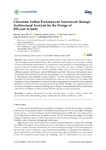Classroom Indoor Environment Assessment through Architectural Analysis for the Design of Efficient Schools

Use this link to cite
http://hdl.handle.net/2183/25330Collections
- Investigacion (ETSAC) [511]
Metadata
Show full item recordTitle
Classroom Indoor Environment Assessment through Architectural Analysis for the Design of Efficient SchoolsAuthor(s)
Date
2020Citation
López-Chao, Vicente; Amado Lorenzo, Antonio; Saorín, Jose L.; De La Torre-Cantero, Jorge; Melián-Díaz, Dámari. 2020. "Classroom Indoor Environment Assessment through Architectural Analysis for the Design of Efficient Schools." Sustainability 12, no. 5: 2020.
Abstract
[Abstract] Optimization of environmental performance is one of the standards to be achieved towards designing sustainable buildings. Many researchers are focusing on zero emission building|nhowever, it is essential that the indoor environment favors the performance of the building purpose. Empirical research has demonstrated the influence of architectural space variables on student performance, but they have not focused on holistic studies that compare how space influences different academic performance, such as Mathematics and Arts. This manuscript explores, under self-reported data, the relationship between learning space and the mathematics and art performance in 583 primary school students in Galicia (Spain). For this, the Indoor Physical Environment Perception scale has been adapted and validated and conducted in 27 classrooms. The results of the Exploratory Factor Analysis have evidenced that the learning space is structured in three categories: Workspace comfort, natural environment and building comfort. Multiple linear regression analyses have supported previous research and bring new findings concerning that the indoor environment variables do not influence in the same way different activities of school architecture.
Keywords
Acoustics
Acoustics Environmental quality
Learning space
Occupant comfort
Sustainable architecture
Sustainable building
Visual comfort
Thermal comfort
Ventilation comfort
Acoustics Environmental quality
Learning space
Occupant comfort
Sustainable architecture
Sustainable building
Visual comfort
Thermal comfort
Ventilation comfort
Editor version
Rights
Atribución 4.0
ISSN
2071-1050






